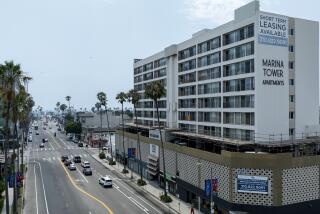Billionaire’s Arrest Rattles Russian Business Elite
- Share via
MOSCOW — The arrest of a Russian oil billionaire is shaking this country’s political and business elite, with critics charging Thursday that the aim in the case is to undercut Mikhail Khodorkovsky, the country’s richest man and a close associate of the detainee.
Platon Lebedev, head of an investment group that owns a majority interest in Yukos Oil Co., was detained Wednesday on charges of defrauding the government of $283 million by illegally taking over the state-owned stake in a fertilizer plant in 1994, authorities said.
That was a time of chaotic post-Soviet privatization, when well-connected individuals gained ownership of huge state assets for practically nothing.
“The charges ... appear to be completely far-fetched,” said Yuri Kotler, chief spokesman for Lebedev’s group. “There are very many people in this country who can be accused of committing a financial crime in 1994. The entire case raises a multitude of questions: Why now? Why 1994?”
The prosecutor general’s office also announced late Wednesday evening that Alexei Pichugin, the head of a security department at Yukos, Russia’s biggest oil firm, has been arrested on charges of organizing a double murder last year.
Khodorkovsky, the chief executive and biggest shareholder of Yukos, is a financial backer of opposition parties that will challenge pro-Kremlin forces in December elections for the State Duma, the lower house of parliament. Forbes magazine this year estimated his net worth at $8 billion and Lebedev’s at $1 billion, putting them first and 13th on the list of Russia’s richest people.
Khodorkovsky has been summoned to appear at the prosecutor general’s office today as a witness in the embezzlement case, the Russian news agency Interfax reported late Thursday.
Valeriya Novodvorskaya, a liberal politician who heads the small opposition Democratic Union party, said that by having Lebedev arrested the Kremlin can frighten other businessmen into contributing to parties that support Russian President Vladimir V. Putin.
“Whatever Lebedev did back in 1994, it looks highly strange to try to launch an investigation of those offenses only now, nine years later,” she said. “It very much looks like today’s Russian authorities prefer to use the old Bolshevik and Mafia methods.... Theoretically, it will be possible to have all those the regime finds disagreeable or all those who have refused to ‘voluntarily’ donate money to pro-government political parties behind bars very soon.”
The daily newspaper Gazeta described Lebedev’s arrest as “a strike at Yukos owner Mikhail Khodorkovsky” and “a signal to other oligarchs who have political ambitions.”
Earlier warnings have also been directed at Khodorkovsky, in particular the release of a report this spring “allegedly written by certain political scientists” that charged that “oligarchs, including Khodorkovsky, were aiming to seize power in Russia,” Gazeta said.
Khodorkovsky has also pushed a plan for Yukos to merge later this year with a smaller rival, Sibneft, to form one of the world’s largest oil companies -- a step that could also boost the company’s political clout. Yukos shares fell 6% Thursday.
Other tycoons -- known in Russia as “oligarchs” -- who got rich during post-Soviet privatization but later fell out with Putin are Boris A. Berezovsky and Vladimir A. Gusinsky. Just a few years ago, both of them provided financial muscle for media companies that carried reporting critical of the Kremlin, but now they have lost control of those properties and live in exile. Berezovsky still tries to be politically influential from his base in London.
Pavel Voshchanov, a political analyst with the Tribuna newspaper, said Lebedev’s arrest “is PR and electioneering, pure and simple.”
“There is not a single businessman even with moderate money in this country, to say nothing of millions or billions of dollars, who hasn’t cheated the state and misappropriated government money,” Voshchanov said. “There are no people like this in Russia and everybody knows this. That means that until recently a blind eye was turned to crimes like the ones Mr. Lebedev is charged with, and now, all of a sudden, the law enforcement bodies have miraculously recovered their sight and are ready to punish the criminals. Sounds noble on the face of it. But the only question that remains is: ‘Why now?’ ”
Voshchanov said the goal is to exploit public anger at “oligarchs plundering the national wealth and selling it abroad.” Pro-Kremlin parties’ parliamentary campaigns and Putin’s own reelection bid next year will be built around an anti-oligarch theme, he predicted.
“All elections in post-communist Russia have always been based on fear,” he said. “First the country feared the return of communists. Then the country feared Chechen terrorists. Now the time has come for the country to watch out for oligarchs who have been plotting against the current authorities.... Given the traditional dislike for the rich in Russia, there is hardly any doubt left that this call of the authorities will be heard and supported by the embittered masses.”
*
Alexei V. Kuznetsov of The Times’ Moscow Bureau contributed to this report.
More to Read
Sign up for Essential California
The most important California stories and recommendations in your inbox every morning.
You may occasionally receive promotional content from the Los Angeles Times.













